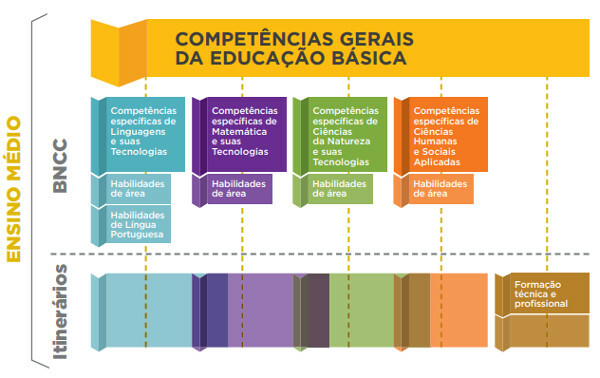On the afternoon of last Tuesday, April 3rd, the Minister of Education, Mendonça Filho, delivered to the National Council of Education (CNE) the stage of the Common National Curriculum Base (BNCC) regarding Education Medium. The next step in the curriculum reform is the discussion with society for the implementation of the proposal.
See the document
As expected, the central point is the flexibility of curricula, allowing areas of knowledge with a minimum workload established, in addition to hours for deepening in areas of interest to students. However, BNCC is not a curriculum, it just establishes a point where one wants to reach, according to the MEC. The responsibility for curricula lies with education networks and schools.
The document ensures that all schools in the country develop their curricula based on an organic and progressive set of essential learning. The base also affirms the importance of implementing schools for full-time education.
Workload
Despite making the curricular structure of secondary education more flexible, the BNCC determined an increase in the workload of 2,400 hours (the equivalent of four hours of class per day, on average) to 3,000 hours (the equivalent of five hours a day, in average). Of this total, 1.8 thousand hours are for common subjects and the remaining time for deepening the training itinerary chosen by the student.
mandatory subjects
Portuguese Language and Mathematics will be the only compulsory subjects throughout high school. The others, such as Chemistry, Physical Education and Sociology, will be present at the BNCC, but will be optional in the second part of high school.
Do not stop now... There's more after the advertising ;)
After the BNCC workload is completed, high school students will be able to choose between five training itineraries: Portuguese Language and its Technologies; Mathematics and its Technologies; Natural Sciences and its Technologies; Human Sciences and its Technologies; Technical and Professional Training.

The reform
Provisional Measure No. 748/2016, who authorized the reform, was sanctioned by President Michel Temer, in February 2017. The text went through more than 500 amendments by deputies and senators, which resulted in a change in controversial themes and made the reform of secondary education a little more flexible.
The change from high school through a Provisional Measure and without consulting society generated a lot of debate and protests, which caused occupations in schools in several states in 2016, which is why it postponed the application of the National Secondary Education Examination (And either) for part of the subscribers.
The exclusion of some subjects, like Arts and Physical Education and Philosophy and sociology, the opening for professionals without a degree to teach Technical and Professional Training and general implementation of comprehensive education were the most controversial issues.
Implementation
A deadline has not yet been stipulated for the CNE to discuss the base and start implementing it. The first stage of the BNCC was concluded with the completion of the specific basis for preschool and elementary education, which should be implemented by 2020.
